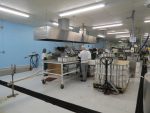Heritage Health Food Acquires Worthington Frozen Foods and Cedar Lake Brands
By Jiggs Gallagher, September 27, 2016: Heritage Health Food (HHF), a seven-year-old Collegedale, Tennessee, vegetarian food company, has acquired two major brands familiar to Adventists. This has more than doubled the products offered by the small company.
The Worthington brand of frozen foods, which had been produced by the Kellogg Company of Battle Creek, Michigan, since 1995, was sold to HHF in February. In April, the company bought the Cedar Lake brand from an independent company in Cedar Lake, Michigan. Worthington was originally a company spun off from the Worthington Sanitarium when it was an institution affiliated with Adventist-laymen’s Services and Industries (ASI). Worthington Foods became a publicly-traded corporation in which the majority of the stock was owned by Adventists and later purchased Loma Linda Foods from the denomination. The sanitarium became a mental-health facility now part of Ohio State University. Cedar Lake was founded by Adventists in the small Michigan town of the same name in 1949.
Don Otis, president and founder of HHF, worked for Kellogg’s for 14 years as director of natural and specialty foods, overseeing Worthington, Loma Linda, Gardenburger and Kashi products. He had worked for Worthington when it was still an independent, Adventist-oriented company based in Worthington, Ohio, a suburb of Columbus. He transferred to Kellogg’s when it acquired Worthington Foods. “I knew that Kellogg’s might decide to divest the legacy Adventist brands someday, and the opportunity came up this year,” he said recently.

Otis began his career in the denomination’s publishing program, working as an Adventist Book Center (ABC) manager in Pennsylvania, Nevada and Massachusetts. The nephew of longtime Review and Herald Publishing Association manager Bud Otis and the son of an ABC manager, he felt Adventist health foods were an adjunct to selling books and other literature. But he gradually saw health food as very valuable in its own right.
“I never thought I would go into food manufacturing, but I had success selling food in my ABCs over the years. Eventually I saw more clearly the importance of healthy food in our Adventist health message. God intended that the health message and the spiritual message would go hand in hand.”
Working at Kellogg’s, Otis became frustrated with the company’s lack of focus on healthy vegetarian products. “We notice that consumers are demanding healthier, non-genetically modified (GMO) products. Kellogg’s uses genetically modified soy, as well as artificial flavors and colors. European Union countries, a huge market, will not import such products.”
Jon Fish, director of marketing for HHF, says production of the Worthington brands is on schedule. “We began making all the Worthington products except Stripples in mid-August. These include ‘chicken’ and ‘turkey’ slices, Golden Croquettes and Wham. Various brands will be released to distributors at different times this year. The distributors control the roll-out.”
Otis says current, pre-acquisition sales by the company total about $12 million per year. Fish expects that figure will more than double in the next five years.
When preparing to start HHF in 2009, Otis noted the success of Sanitarium Health in Australia, the company owned by the denomination’s South Pacific Division that is one of the largest food makers in that nation. He felt that both the denomination’s North American Division and private companies here had become discouraged with the health food business, and that an opportunity to influence the public was being lost. “I visited Sanitarium Health in Australia,” Otis says. “Through the profits from food sales, the company is supporting much of the mission work in that part of the world.”
HHF will move all of its production to Cedar Lake, Michigan, from the current Ooltewah, Tennessee, site. “Our director of operations, Sean Otis, has already relocated to Cedar Lake,” says Fish. “However, our management, sales, marketing and finance staff will remain in Ooltewah.”
The Worthington brand’s line of canned vegan and vegetarian foods remains owned by Atlantic Natural Foods, a company with no organizational ties to Adventists. (Kellogg’s sold the canned products to Atlantic several years ago.) That company will continue to market those products for several years, and might consider selling its rights to HHF at some point. “Heritage is already manufacturing and distributing an extensive line of canned vegan and vegetarian foods in its Cedar Lake and existing Heritage line of products,” says Fish.
“It is our goal that every product manufactured and sold by Heritage Health Food be non-GMO, vegan, 100 percent meat-free and free of all artificial ingredients. We also intend to grow our gluten-free line of veggie meats as well,” he adds.
Fish says the company will market aggressively to both Adventists and other health-conscious consumers. “We are dedicated to providing our Adventist audience with the foods they love as well as serving the health and wellness needs of both groups. The wider market is actually demanding that manufacturers create healthier options, including foods that are non-GMO, low- or no cholesterol, higher in fiber and allergen-friendly (free of dairy, eggs, nuts, peanuts, seafood, etc.). This translates into a growing health-conscious consumer base that is actively looking for vegan and vegetarian alternatives for one or more meals per week,” he states.

The company rolled out a sports mascot this summer at a Chattanooga baseball game. “Reggie the Veggie Hot Dog” was well received at the game, according to Otis. It will serve as a corporate identity symbol in the future. He adds that HHF has a simple mission statement: “Uniting the heritage, shaping the future.”
Jiggs Gallagher is a senior news editor for Adventist Today and a journalism professor for California State University who spent a career as a communication officer for Adventist institutions and teaching journalism in Adventist colleges. The graphics with this article include the logos for Heritage Health Foods and its key brands, a photo from inside the factory in Cedar Lake, Michigan, and a photo of the corporate mascot, Reggie the Veggie Hot Dog.




